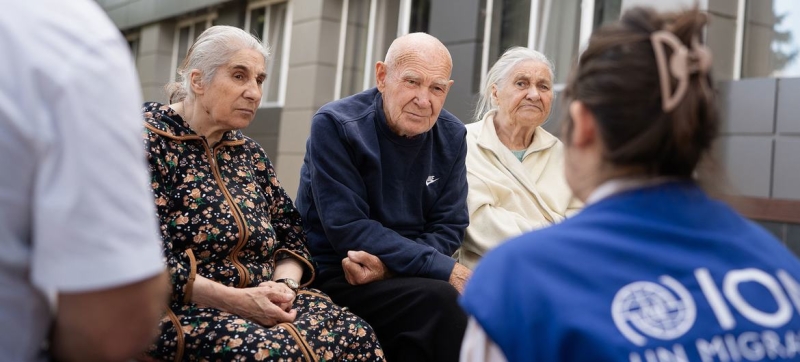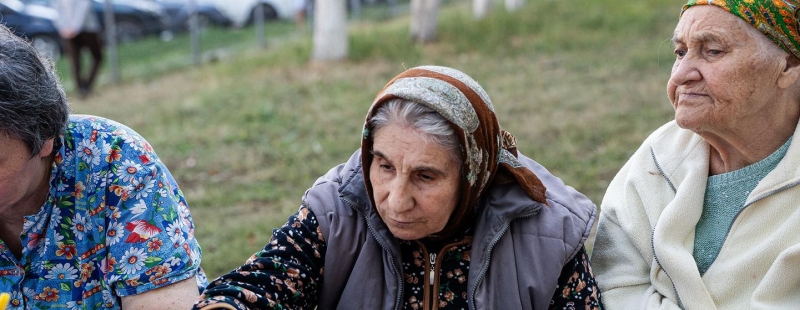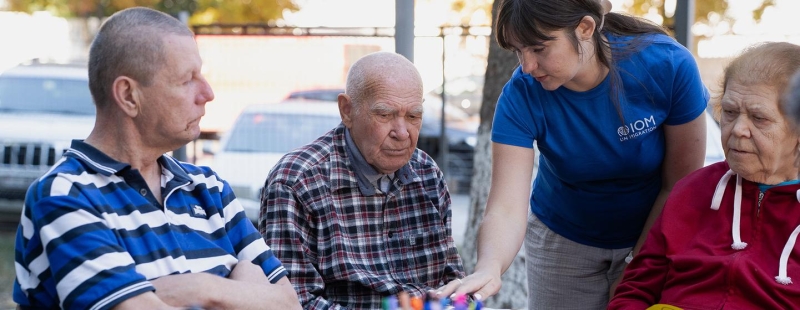
Yuri (center) receives psychological support in Chisinau, which helps him cope with loneliness. “Healing is possible even in the shadow of war”: Ukrainian refugees receive psychological support in Moldova Refugees and Migrants
“I saw people leaving and joined them,” says 88-year-old Yuri, recalling the day he left Ukraine. “I came to Moldova alone, without family or children to turn to,” he adds.
Yuri spends most of his time in the courtyard of the Mental Health Center in Chisinau – the largest in the country. The center receives support from the International Organization for Migration (IOM), a UN agency.
Here the pensioner participates in therapeutic activities that help him cope with his feelings and maintain peace of mind. Yuri feels very lonely, but being with others at the center brings relief. “I feel good here, but in Moldova everything is new to me,” he says. – Sometimes it’s fun in the center. I communicate with people, but I don’t really have friends. Maybe it’s because I’m already old.”
One of Yuri’s neighbors in the center is 73-year-old Ana, who often sits next to her 79-year-old friend Alla. Ana is originally from Moldova, but before the war she lived in Odessa, where she worked as a cleaner at the university.
“I liked cleaning,” she says. “As a child, I always helped my mother because she needed help, I had a younger brother.”
When a full-scale war began, Ana’s family persuaded her to return to Chisinau. Even though she was reunited with her relatives, she felt anxious and depressed. She agreed to see a psychologist, although reluctantly.

Ana (center) in a therapy session.
“I felt really bad,” she says. “At first I didn’t want to go to this center, but in the end I’m here.”
Ana was hospitalized in July 2023 with severe anxiety and insomnia. In the first weeks, she attended individual and group counseling, art therapy, went for walks in the fresh air and played team games. Gradually her strength returned. She became more sociable, her sleep improved and her mood lifted.
“Here I found my home,” says Ana. “Now I’m not afraid anymore.”
25-year-old Margarita, whom her friends call Margot, is also undergoing therapy at the center. She is originally from Ukraine and came to Moldova about a year ago. She has been struggling with eating disorders since she was 15.
A few months ago her condition worsened, she realized that she could no longer cope on her own and sought help.
In her homeland, Margot was a mathematics teacher and analyst. Because of the war, she was left without work and lives away from her family. Every day she was accompanied by a feeling of uncertainty and uncertainty.
“I never wanted to ask my family for help because I thought I was strong,” she says. “I was wrong. Having arrived here, I realized that there are people ready to support me. Never be afraid to ask for help,” adds Margot.
In the early days of the war in February 2022, thousands of people crossed the Ukraine-Moldova border in search of safety.
“Authorities mobilized various sectors to coordinate the response, including preparation of psychological support measures,” said Arkady Astrakhan, director of the Chisinau Mental Health Center on the eve of World Mental Health Day, which is celebrated on October 10.

IOM experts help elderly Ukrainians get the help they need.
Since 2023, the International Organization for Migration (IOM), a UN agency, has been supporting the center, which has expanded the range of specialized services in the field of mental health and psychosocial support for refugees from Ukraine. These include the services of mobile teams, psychiatric and psychological counseling, social events, art therapy, housing for the elderly and people with disabilities, as well as a drug rehabilitation program.
IOM currently provides nearly 90 percent of the center’s services and also helps train staff, including how to manage complex cases. Patients with chronic or severe mental disorders continue to face significant barriers to care.
“IOM has been instrumental in closing these gaps,” says Astrachan. “Supporting people with these needs can be challenging, but at the same time extremely important.”
Just an hour from Chisinau, in Orhei, there is a Community Mental Health Center, renovated by IOM teams. There, the organization’s experts work with people with severe mental disorders.
Since the beginning of the war, 1080 Ukrainians have received specialized psychological support within the framework of IOM programs in Moldova. A key element of this support has been peer-to-peer initiatives. Ukrainians with medical education or relevant life experience help their compatriots.
In the community centers of Moldova, help takes on a variety of forms. For Yuri, the most important thing is communication, thanks to which he feels less lonely. For others, it’s therapy sessions or even just the realization that help is nearby. Their stories remind us that even in the shadow of war, healing is possible.
*This article was based on materials from the International Organization for Migration (IOM).
